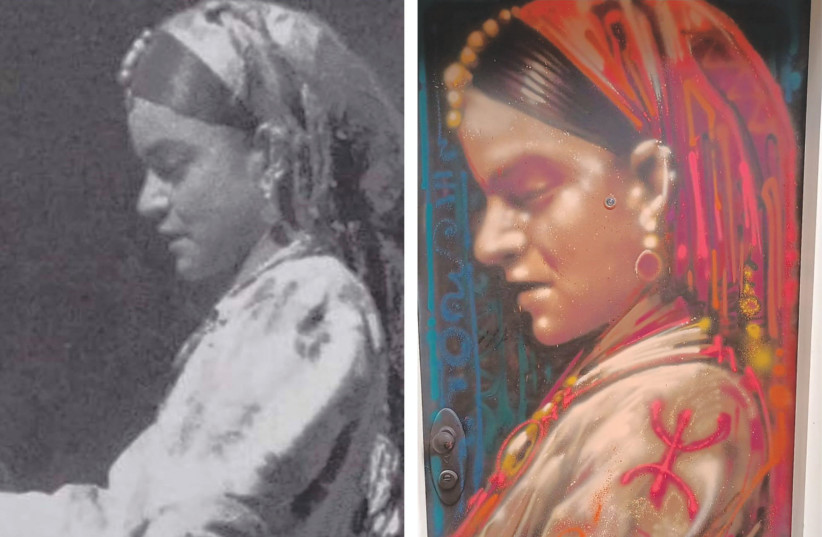Almost everyone who lives in Jerusalem has their favorite vendor in Mahaneh Yehuda, the one who has “the best” tomatoes or mangoes or greens. And almost everyone has their favorite restaurant or bar in the shuk which opens once the fruit and vegetable markets close. And many have a favorite graffiti mural painted on steel shutters, by local artist Solomon Souza.
Tali Friedman, the chairwoman of the Mahaneh Yehuda market association, certainly has her favorite. She woke up on Tuesday morning, just a few days before the 100th-anniversary celebrations for the market, to find that Souza had painted a portrait of her grandmother from Morocco, Penina Sabbag, as a young girl, on the shutters of her business, The Atelier of Tali Friedman, where she gives tours of the shuk and cooking classes. Friedman said her grandmother basically raised her until she was 11, and that her cooking style was heavily influenced by her grandmother.
Mahaneh Yehuda was originally registered with the British Mandate authorities in June 1922, meaning the 100th birthday celebrations should have been held a year ago but were delayed because of corona. While the market originally began during the Ottoman Empire, with Arab farmers and villagers bringing their produce to the area, it was only during the Mandate that the British Mandate governor appointed a city planner named Charles Robert Ashby and an architect to draft a plan for the market, including proper sewage and garbage disposal.
His plan was never implemented, as it cost too much money, but the shuk continued to grow. Some of the Arab merchants sold their stalls to Jewish merchants, many of whom continue to operate them today. The Mahaneh Yehuda market association has more than 600 members, Friedman said.
“The 100th birthday is the right time to celebrate this market,” she told The Jerusalem Post. “We need to thank the vendors who created this market and still work in it. This celebration is all about the people and their stories, which is really the narrative of Jerusalem and the whole country.”

A visit to the bustling market during the day, or evening, is as essential to the tourism experience as going to the Kotel or the Dead Sea. The shuk is a microcosm of Israeli society, she said, with stall owners from various countries. Recently, some of these stall owners have sold their businesses to restaurants or bars, which make the shuk the place to be at night, especially for Birthright groups and anyone under 21. Neighbors who live in the area have complained about the noise late at night and inebriated patrons.
The shuk is also about food, and some of Jerusalem’s most iconic restaurants, such as Azura, Sima, Hatzot and Jacko’s Street, are in the shuk. Some of these places have been around for decades.
The celebrations kick off Sunday evening with a slew of free musical performances in and around the shuk sponsored by the Jerusalem Municipality.
The concert by Hadag Nahash at 9 p.m., where the band is hosting Shuli Rand and Zehava Ben, is sure to be a crowd-pleaser. For those of you with a religious bent, there is Algiers Jerusalem at 9:45 p.m., which is described as “a musical journey with poetry and prayers from Algiers.”
For the storytellers among you, there is “Singing and Telling in the Market,” a show that is “a stroll through the alleys of time in the market and an encounter with characters, tastes and smells through stories, songs and memories.”
And, of course, there must be food. Some of Jerusalem’s most famous chefs will compete for “the dish of the century” in a cooking competition to decide which chef’s dish most tells the story of the shuk.
The future of Mahaneh Yehuda
ON MONDAY, a conference titled “What Does the Future Hold for the World’s Most Famous Markets?” will be held at the Inbal Hotel as part of the centennial celebrations. Guests include the head of the historic market in Florence and the heads of the following famous markets: Borough Market in London, Boqueria Market in Barcelona, Market Halle Neun in Berlin, as well as marts in Japan, Mexico, Thailand, and Georgia.
The topics of the conference include panels on the future of markets in Israel and the world and how to make them more competitive.
Guests will also attend a culinary event, a lunch called “Chefs Cooking Market,” with the participation of some of Israel’s most famous chefs, including Assaf Granit and Uri Navon from Machneyuda, Avi Levy from Hamotzi, Keren Kadosh from Café Kadosh, Kfir Haddad, the chef of the Inbal Hotel, and Nimrod Norman of the 02 restaurant at the Inbal Hotel.
Friedman said urban markets can be an economic and social anchor for a community.
“When people travel around the world, they want to visit markets the same way they visit museums,” she said. “A market is the museum of life.”
For details of the centennial celebration: https://www.jerusalem.muni.il/en/experience/allevents/100_machne
